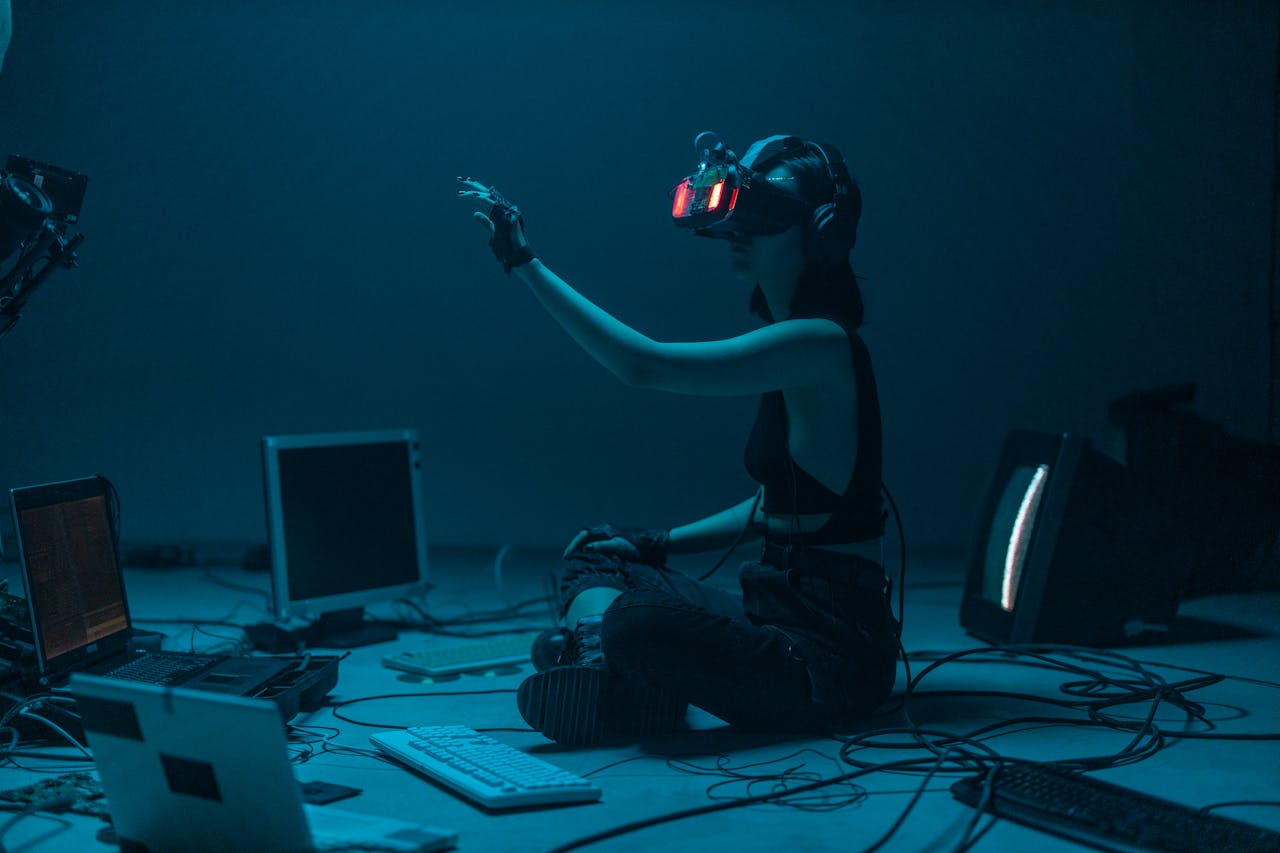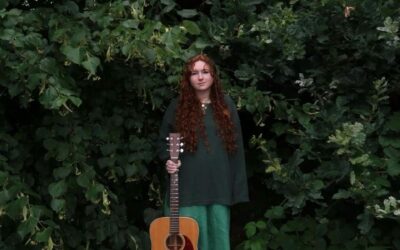Over the last few years, artificial intelligence has punctured the music industry like a lightning bolt. AI is not just a crescendo but also a paradigm shift presenting the unique opportunity to transform the music industry into a dynamic ecosystem of creativity, and efficiency. Simultaneously, the fear of composers being replaced by AI is a concern shared by many artists on social media.
However, some composers are finding new ways to harness generative AI creatively.
Zoe Lin, also known as ‘Sebastian Negretshei,’ is one of those composers hopping on the trend – Lin’s electroacoustic music compositions have utilised innovative techniques such as AI development, 3D immersive sounds, and VR [virtual reality].
Since becoming a full-time composer in 2017, her works have been performed globally and featured in festivals such as the World Saxophone Congress and the BIFAN Film Festival. Through her recently launched organisation ‘Women in Music Tech,’ Lin hopes to provide women with the tools and knowledge to follow her path.

5678: As a woman, mother, and minority in a male-dominated industry how has AI helped you navigate motherhood and your career ambitions?
Zoe Lin: I studied composing at Wisconsin Madison University, but life got busy after I got married. I had a kid and started teaching. There was very little time for music. That’s when I turned to AI. I started making electroacoustic compositions, letting the computer handle most of the work so I could still pursue my passion without the need for a full orchestra rehearsal. I began learning the basics of programming languages such as Phyton for my electro compositions. Merging my music with 3D gaming scenes through Unity [software], it elevated my classical compositions and made it more engaging and innovative to regular audiences.
There was no need for concerts and rehearsals. Through this media, I could showcase my work globally. Technology liberated me as a busy mom and put me back into the job market.
ZOE LIN
5678: Did your 2016 project with the artist ‘Solo Saxophone’ intentionally show how composers teaming up with AI can save time and space in their creative process, or did that just happen by chance?
Actually, by total chance! I composed this piece for two years- it’s twenty-five minutes long with six movements intended for one saxophone player and a pianist. We scheduled a concert and even found a pianist to play the piano part.
However, the pianist disappeared from us before rehearsals. Without a piano player for the concert, of course, we panicked. But, then I was like how about if my computer imitates a pianist playing the piano through sample-based synthesis [advanced algorithms analysing the nuances of the piano, capturing its unique sound and characteristics].The saxophonist could perform alongside the piano part like Karaoke. Therefore, the need for rehearsals and a pianist were resolved. The project also incorporated 3D and VR elements. It has since been performed at the World Saxophone Congress 2018, and many countries.
~After that in 2017, Lin was appointed as Music Officer at an AI company. She programmed generative commercial AI music for stores. However, exploring algorithms excited her more than her previous 3D work. Regenerative AI provided Lin the chance to experiment with various musical genres and styles. After three years of commercial music, Lin decided to ditch the corporate gig. The pull of being a full-time artist and composer was just too strong to resist. In the next few years, she went on to explore visual synesthesia through immersive mixing techniques and virtual reality.
5678: The online discourse around AI tends to focus on the replacement of jobs, creativity, and ownership. While all of these are debatable. AI-powered sounds can make a positive impact. Your recent work ‘Diving into Siraya’ shows just that. Could you tell us what the project was about?
Zoe Lin: ‘Diving into Siraya’ is an experimental interactive VR documentary. We are trying to get the public involved in reviving a dead tribal Taiwanese language.

Siraya was an aboriginal tribe in Taiwan, their language died because people stopped speaking it, due to globalisation and the Chinese government imposing a uniform language onto Taiwan. The tribe had a special culture of hunting deer, and singing for ceremonies. When the tribe started to sing their songs they would cry because they thought their god was coming. Through virtual reality, immersive 3D sounds, and speech recognition audiences can learn about their culture, singing ceremonies, and how the language is revived. For example, when they put on their VR headset and see a deer, it will show them how to pronounce it in Siraya and if they name it correctly the story will progress.
-5678: How did the VR film ensure that audiences pronounced the words correctly considering that Siraya is a dead language?
Zoe Lin: We used linguistic experts, and AI algorithms to reconstruct the Sirayan language based on archaeological findings and historical records. To mimic the sound of the language the public was able to donate their voice, which was then processed with AI speech recognition technology. Combining these aspects provided a human touch and accuracy to our interactive film. Audiences could immerse themselves and get a better grasp of the sound of the language.

-5678: It’s amazing how AI provides the potential to revive dead languages. Which brings me to my next question. Some of our readers are young women who want to become composers or producers themselves. What software do you use?
Zoe Lin: I used Max/MSP at the beginning for my compositions. I generally synthesised sounds myself. DAW [ Digital Audio WorkStation] on Mac is a good entry-level software. For my VR work, I use Unity.
5678: The AI branch of the music industry is still fairly niche and male-dominated. Can you give us your account on the gender imbalance in the industry?
Zoe Lin: When I participated at many conferences there was quite a big gender disparity. The portion of the male to female participants and audiences is far from equal. In Taiwan, I think it’s also due to cultural perceptions. In my generation, girls were expected to study literature or art. Regardless of traditional views technology is very suitable for women and especially female artists. Programming requires patience, a skill that many women have. Through more female role models and providing women with the tools we will see more balance hopefully in the future.
-5678: You chose a male pseudonym, ‘Sebastian Negretshei.’ Was that in response to the gender imbalance?
Zoe Lin: I wanted to see if my work gets more opportunities as a white man instead of an asian woman. Taking inspiration by JK Rowling. I was invited to a handful of conferences through this pseudonym however, I can’t say if it made a huge difference to how my work was viewed. My sample frame was too small.
-5678: That brings me to my next point. ‘Women in Music Tech’ is an organisation you founded in 2023. Could you tell us more about it?
Zoe Lin: ‘Women in Music Tech’ focuses on online meetings, forums, and speaking events using technology to overcome distance and time limitations for women.
Through my experience, people like me with kids need something like this. A casual group that doesn’t require a lot of commitment. I wanted to create an organisation centred for exchanging ideas and projects about music technology.
Zoe LIN
5678: What inspired you to take a leadership role by creating this platform for female musicians in music tech?
Zoe Lin: Many years ago, before I decided to become a full-time composer. I was invited to an initiative hosted by the Taiwanese government. It was a summit of top female managers of private companies in Taiwan. I became inspired by their resilience, experiences, and how they run their companies.This inspiration was passed on to me by these women and I hope I could do the same through my organisation.

-5678: What advice would you give to young women who want to get into the music industry, in particular music tech?
Zoe Lin: We as women sometimes have this limiting belief that we aren’t good enough, need permission to start going for our goals, or that someone can do them better. I want you to look past your current situation and believe in yourself. I hope women know that these amazing developments are happening right now and they can be a part of it. You’re not the first generation to deal with difficulties; some women can help, motivate, and inspire you. Whether it is composing, singing, or producing music. There is space for you.




